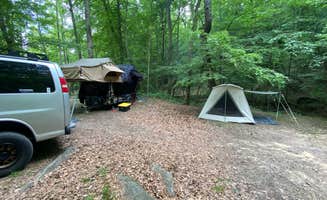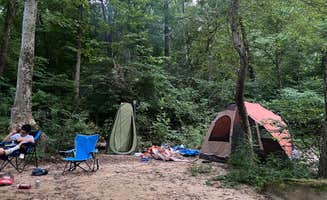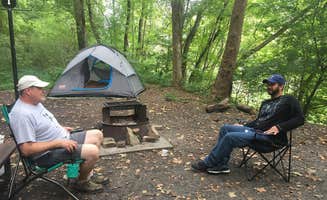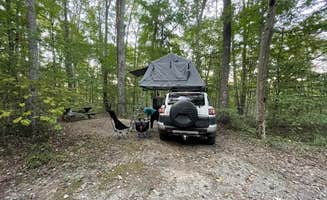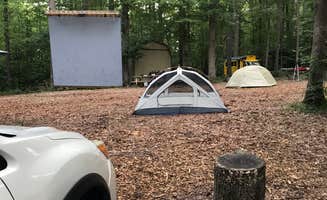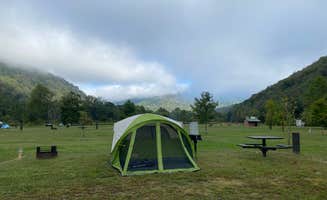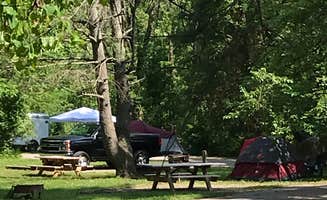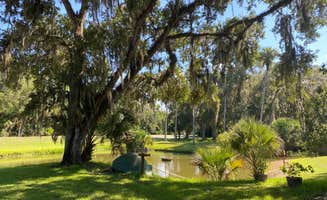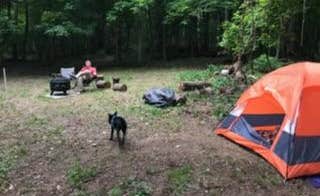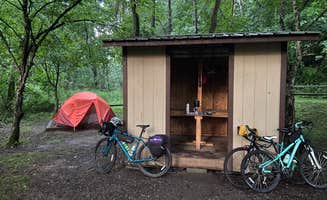Tent camping near Scarbro, West Virginia offers primitive sites across rugged Appalachian terrain with elevations ranging from 1,400 to 2,800 feet. The region's moderate climate features summer highs around 85°F and winter lows near 20°F, with slightly cooler temperatures at higher elevations. Most tent camping areas require visitors to pack in drinking water as potable sources are limited throughout the camping zones.
What to do
Rock climbing access: The New River Gorge Campground - American Alpine Club provides ideal access to multiple climbing locations. "It's a quick walk to the Junkyard Wall or a short drive to many other classic crags," explains one experienced climber. The campground includes a training area with a campus board for climbers looking to maintain strength during longer trips.
Hiking options: Multiple trail systems connect to camping areas, providing day hikes ranging from 1-6 miles. "We hiked Endless Wall Trail and Glade Creek Trail to Kate's Falls," notes a camper who stayed at Bluestone Lake State Park. Most trails feature moderate elevation changes with some steeper sections near gorge overlooks.
Fishing opportunities: Access to both lake and river fishing exists within short distances of most campgrounds. At Plum Orchard Lake WMA, you'll find "a beautiful lake nestled in the mountains of Fayette county" that's "great for kayaking." The New River provides additional fishing access with stronger currents better suited for experienced anglers.
What campers like
Secluded river sites: Stone Cliff Campground offers peaceful riverside camping with natural separation. "I used one of the walk in sites about half a mile into the trail. There was plenty of room for 4 tents right along the river," shares one visitor. The sandy riverbank provides comfortable tent setups with natural sound barriers between sites.
Wildlife viewing: Morning and evening hours offer opportunities to spot local wildlife. Near Plum Orchard Lake, campers report seeing "deer, raccoons and some nice looking birds." The forested settings provide natural habitat for small mammals and numerous bird species, especially during migration seasons.
Community atmosphere: For social campers, Chestnut Creek Campground creates opportunities to meet fellow outdoor enthusiasts. "This place is run by the family that lives there and has been my go to spot for stays at the New. Great launching pad for river activities and climbing," explains a regular visitor. The campground offers communal areas where campers often share information about local conditions.
What you should know
Train noise considerations: Several campsites near the New River are within hearing distance of active rail lines. At Brooklyn Campground, "there is an active railroad across the river and there were probably 5-10 trains the Wednesday night that we stayed." Earplugs are recommended for light sleepers, particularly at riverside sites.
Access road conditions: Many campgrounds require navigation of unpaved roads. Plum Orchard Lake WMA involves "long, bumpy dirt road to reach the campsite" that "could be fun in the right vehicle." Higher clearance vehicles perform better during wet weather when accessing more remote camping areas.
Water availability: Most sites require bringing drinking water. At Chestnut Creek Campground, "no electric or water at site but bathhouse with showers" provides limited water access for washing. Plan to pack in all drinking water for your stay as few reliable sources exist near tent sites.
Cell service variability: Coverage ranges from none to moderate depending on campground location and carrier. "We have Verizon and had 1-2 bars of service" at Meadow Creek Campground, while other areas have no reception. Download offline maps before arrival as navigation may be challenging in areas without service.
Tips for camping with families
Protected swimming areas: Avoid strong river currents with younger children by utilizing lake swimming options. Plum Orchard Lake WMA provides "a beautiful area with plenty of fishing and hiking areas within a 20 mile radius or so. The lake is good for swimming but you're welcome to bring your boat, kayak or canoe too."
Campground layout considerations: Tent sites vary significantly in privacy and access difficulty. At Chestnut Creek Campground, "most sites are simple with just a picnic table and fire pit. There are lots of trees in between many of the sites for great privacy." These natural barriers help contain noise from neighboring sites for families with earlier bedtimes.
Weather preparation: The mountain region experiences rapid weather changes, particularly afternoon thunderstorms in summer months. "The wind here is also very strong and without strong anchors could easily pull up your tent. We were having to restake the corners throughout our stay," reports a camper at Meadow Creek Campground. Bring extra stakes and rain protection for unexpected weather.
Tips from RVers
Site limitations: Most campgrounds in the region heavily favor tent camping over RVs. Meadow Creek Campground now restricts access to tents only after safety concerns. "The ranger informed us someone who stayed here in a rv had a close call crossing the train tracks and now they have decided to make this campground a tent only place," explains a visitor, noting that "this place is beautiful and the sites were big enough for rv and tent use" prior to the restriction.
Access challenges: RVers should carefully research approach roads before arrival. "You have to cross train tracks to get here and it's 4 sets of tracks all are very active with trains coming as often as every 20 minutes and they do not stop," notes a camper regarding Meadow Creek. These crossings can be especially challenging for larger vehicles and trailers.


